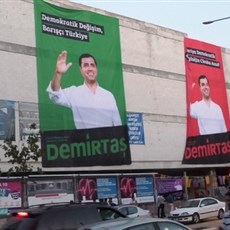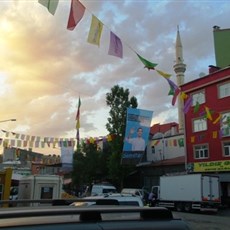10
August, to Doğubayazit by bus from Kars
Öğretmenevi
72TL
Election day in Turkey*. Though we have
seen campaign posters in towns and cities (fewer than we expected), there was little
sign of queuing voters from the windows of the two buses that brought us back
to Doğubayazit. On board we met a young Italian couple, both mathematicians, in Turkey to
climb Ağri Daği (Mount Ararat).
* Wikipedia: “Presidential elections were
held on 10 August 2014 in order to elect the 12th President of Turkey.
Incumbent Prime Minister Recep Tayyip Erdoğan was elected outright with a
simple majority of the vote in the first round, making a scheduled run-off for
24 August unnecessary.
The election took place under reforms
resulting from the 2007 constitutional referendum, which introduced a direct
national vote, rather than election by members of the parliament. Over 55
million people were eligible to vote, both within Turkey and abroad.
Recep Tayyip Erdoğan, leader of the AKP,
first elected Prime Minister in 2002, won with 51.79% of the vote. Former
Organisation of Islamic Cooperation General Secretary Ekmeleddin İhsanoğlu, who
ran as the joint candidate of 13 opposition parties including the Republican
People's Party (CHP) and Nationalist Movement Party (MHP), came second with
38.44%. The co-leader of the Peoples' Democratic Party (HDP) Selahattin
Demirtaş, who received the backing of 8 left-wing parties, came third with
9.76%.
Recep Tayyip Erdoğan took over over as
President from Abdullah Gül on 28 August, while Ahmet Davutoğlu, who was
elected leader of the AKP, succeeded Erdoğan as Prime Minister on the same
date. It has been speculated that Erdoğan will continue to pursue his political
agenda as president while Davutoğlu takes a docile approach as Prime Minister,
breaking away from the ceremonial and neutral functions of the Presidency and
potentially pursuing constitutional changes to turn Turkey into a presidential
or semi-presidential system.
The election was criticised by both the
political opposition and international observers for alleged media bias in
favour of Recep Tayyip Erdoğan, corruption allegations, the inaccuracy of
opinion polls and the misuse of official public resources during Erdoğan's
campaign. While praising the authorities for safeguarding the right to assembly
as well as the peaceful electoral conduct, the Organization for Security and
Co-operation in Europe (OSCE) voiced concerns over the unequal distribution of
campaign resources and media intimidation. The historic 12-year low turnout of
74.13%, attributed to the fact that the election was held in summer while many
citizens were on holiday, was seen by many politicians such as MHP leader
Devlet Bahçeli as a significant factor in affecting the outcome. The election
loss for the opposition CHP resulted in its leader Kemal Kılıçdaroğlu taking
the decision to hold a party convention with a leadership election in response
to growing dissatisfaction against his electoral performance.”
_thumb.jpg)
Mount Ararat (Ağri Daği)
_thumb.jpg)
Mount Ararat (Ağri Daği)
_thumb.jpg)
Mount Ararat (Ağri Daği)

Presidential election (Van)

Presidential election (Kars)